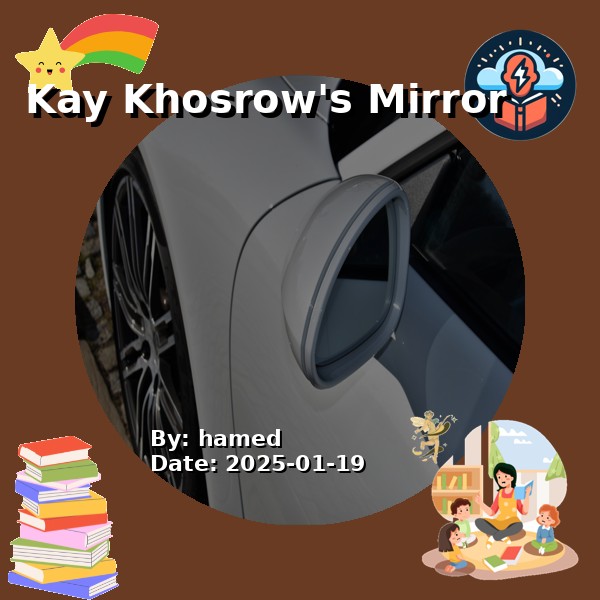The antique shop sat on a forgotten corner of Tehran, sandwiched between a shuttered bakery and a mechanic’s garage. Its owner, Arman, liked it that way. He preferred customers who wandered in by accident, drawn by the faded sign that read “Treasures of Yesterday.”
On a rainy Tuesday evening, as he was locking up, a man in a black coat appeared out of nowhere. He carried a cloth-wrapped bundle under his arm. His face was obscured by the brim of his hat, but his voice was sharp.
“I was told you might appreciate rare things,” the man said, placing the bundle on the counter.
Arman hesitated. Over the years, he’d seen enough fakes to know that rare things usually came with strings. But something about the man—his urgency, or perhaps the way his hand trembled as he unwrapped the object—kept him silent.
The cloth fell away, revealing a goblet-like object made of polished bronze, its rim embedded with emeralds and rubies. Its surface shimmered, as though it were alive.
“What is it?” Arman asked, his voice barely above a whisper.
The man glanced at him, and Arman caught a flash of his eyes—haunted, like a man who had seen too much. “It’s the Cup of Jamshid,” the man said, as if the words carried a weight too great to bear.
Arman frowned. Legends of the cup, also called Kay Khosrow’s mirror, had fascinated him as a child. It was said to show the entire world’s secrets to those who dared look into it. But that was myth, a story from Shahnameh. This… this was just a beautiful relic.
“You expect me to believe that?” Arman asked, a flicker of skepticism returning.
The man smirked, though it didn’t reach his eyes. “You don’t have to believe. Just look.”
He gestured toward the cup. Arman hesitated but finally leaned in, staring into its smooth surface.
At first, he saw nothing but his own reflection, distorted and shimmering. Then, the image shifted. It was no longer his face but the face of a woman he hadn’t seen in decades—his mother, brushing her hair by the window of their old village home. The smell of saffron rice and rosewater filled his nostrils, vivid and real.
The scene dissolved, replaced by another: a vast battlefield, soldiers clashing under a blood-red sky. The clang of swords and the cries of the wounded echoed in his ears.
And then another image: a child crying in a dark alley, clutching an empty bowl. The sound of his sobs pierced Arman’s heart.
The images came faster, overlapping like waves in a storm—wars, lovers, betrayals, triumphs. The world’s secrets, its beauty and horror, unfolded before him. He couldn’t look away.
“Enough,” Arman gasped, stumbling back. His head spun, his chest tight. The cup sat on the counter, still and silent, as though nothing had happened.
The man in the black coat watched him with pity. “It’s not a gift,” he said. “It’s a burden. That’s why I’m leaving it here.”
“Wait,” Arman said, but the man was already at the door.
“Good luck,” the man said, tipping his hat. “You’ll need it.”
The bell above the door jingled as he disappeared into the rain.
For weeks, Arman resisted looking into the cup again. He hid it behind the counter, burying it under old books and faded maps. But he couldn’t ignore its pull.
Late one night, when the shop was empty and the city outside was asleep, he retrieved it.
This time, he didn’t see the past or the future. Instead, he saw himself—older, grayer, standing on the edge of a cliff, the cup in his hands. Behind him, a crowd of faceless people reached out, their voices clamoring for answers.
He understood then: the cup wasn’t just a mirror. It was a choice. To see the truth meant carrying it, sharing it, or perhaps destroying it.
Arman placed the cup back on the counter. Outside, the rain began to fall again, washing the city clean.
He turned off the lights, locked the shop, and walked into the night, unsure whether he’d keep the cup—or let its secrets remain untold.
